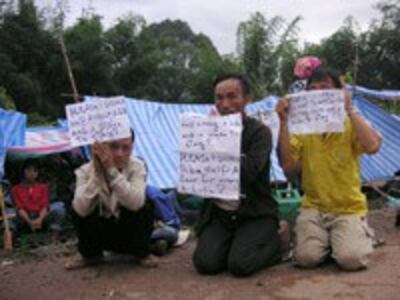
HUAY NAM KHAO, Thailand—Armed Thai soldiers dragged a group of Lao Hmong asylum-seekers from a crowded holding camp here onto trucks to deport them and sent dogs after two who jumped from a moving truck to avoid repatriation, witnesses said.
The military dogs mauled the two men, both in their 20s, and they remain in a Thai hospital, according to witnesses. The witnesses’ accounts contradict Thai and Lao government assertions that the group had volunteered to go back to Laos.
Thai soldiers entered the Huay Nam Khao camp in Phetchabun at 1 p.m. Feb. 27, rounded up 13 Hmong, and dragged them onto trucks, one of the witnesses said. “Some of them hung on to bushes or small trees and had to be pulled free and thrown onto the trucks—bushes were uprooted,” he said.
Three to four soldiers appeared to have been assigned to each Hmong, whose belongings the soldiers collected before leaving the camp around 3 p.m., another witness said. The soldiers said little but indicated they would return over the coming days, witnesses said.
“Two young men in their 20s jumped off the trucks after they started to move. The soldiers sent dogs out to find them and they were badly mauled, and those men are now in Khao Kao hospital” in Phetchabun, one witness said.
Officials say they volunteered
Two young men in their 20s jumped off the trucks after they started to move. The soldiers sent dogs out to find them and they were badly mauled, and those men are now in Khao Kao hospital.
Eleven Lao Hmong were then handed over on Feb. 28 to Lao authorities in Vientiane in what both Thai and Lao officials described as a wholly voluntary operation.
“The Hmong you saw being returned to Laos this morning could be considered lucky. It was a good opportunity for them because they are the first group who wholeheartedly volunteered to go back to their country, without any kind of pressure,” Department of Border Affairs Deputy Director Maj Gen. Voravit Darunchoo said in an interview.
“Therefore the news carried by some media isn’t completely accurate. From what we got from the military task force in Huay Nam Khao, it seems that there are a lot more who want to go back,” Voravit added.
UNHCR questions
U.N. High Commissioner for Refugees (UNHCR) spokeswoman Kitty McKinsey said her agency never obtained access to the Huay Nam Khao camp, but she questioned why these Hmong were returning and whether they had volunteered to go.
In an interview, one of the returnees, Walao Saiyang, said the repatriation was voluntary. “We all wanted to go back and we will feel happy to be back in Laos, where we will be starting new lives,” Walao Saiyang, from Khoune district in Xiengkhouang province, said.
“Now we realize it was a mistake to leave Laos, and we would like the opportunity to start over. We reaffirm that this was voluntary,” he added.
The deportation came ahead of an official visit to Vientiane, the Lao capital, by the new Thai Prime Minister Samak Sundaravej. Thailand said the returning group had set “a good example” for the 8,000 other Hmong in military-run Phetchabun. Thailand has also pledged to clear the holding camp this year.
Some 149 Hmong held at a separate camp in Nong Khai meanwhile threatened a hunger strike if they too are deported. That group has been housed at an immigration center in Nong Khai, about 500 kms (310 miles) northeast of Bangkok, since December 2006, and the UNHCR has called on the Thai government to free them.
These Hmong, who claim to have fled persecution in neighboring Laos, are recognized as refugees in need of protection and should be allowed to leave Thailand to resettle elsewhere, the UNHCR has said. Australia, Canada, the United States and the Netherlands have offered to receive some of the refugees for resettlement.
The Hmong say they fear political persecution in Laos. Many Hmong fought on the side of a pro-U.S. Laotian government in the 1960s and 70s before the communist takeover of their country in 1975.
More than 300,000 Lao, mostly Hmong, fled to Thailand after the takeover. Most were resettled in third countries, particularly the United States, though several thousand were voluntarily repatriated.
Thailand regards the Hmong as migrants rather than refugees and says they have violated Thai law by entering the country illegally. Thai authorities deported more than 300 of them in 2006.
Original reporting by Oratai for RFA's Lao service. Service director: Viengsay Luangkhot. Executive producer: Susan Lavery. Written and produced in English by Sarah Jackson-Han.
